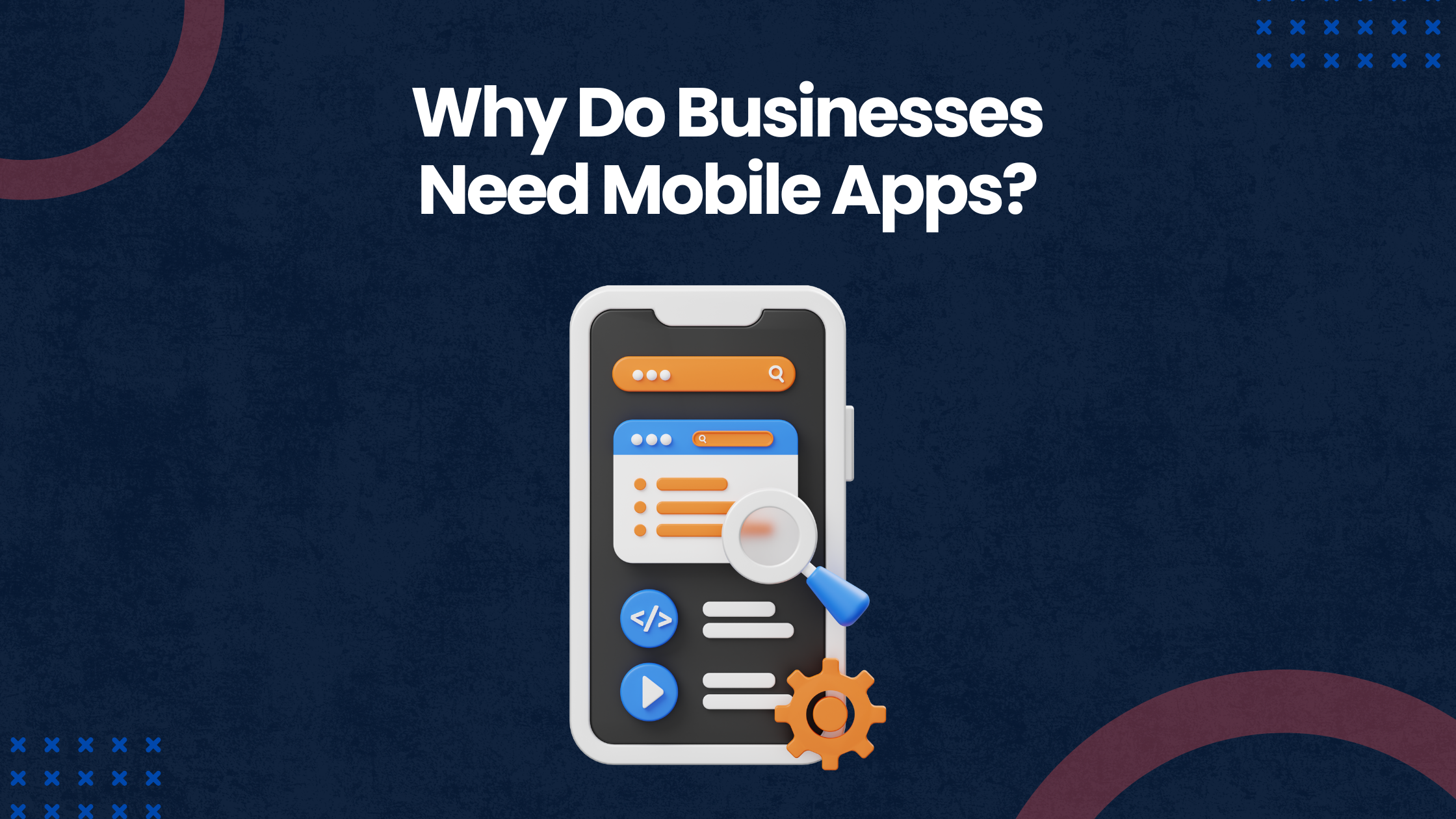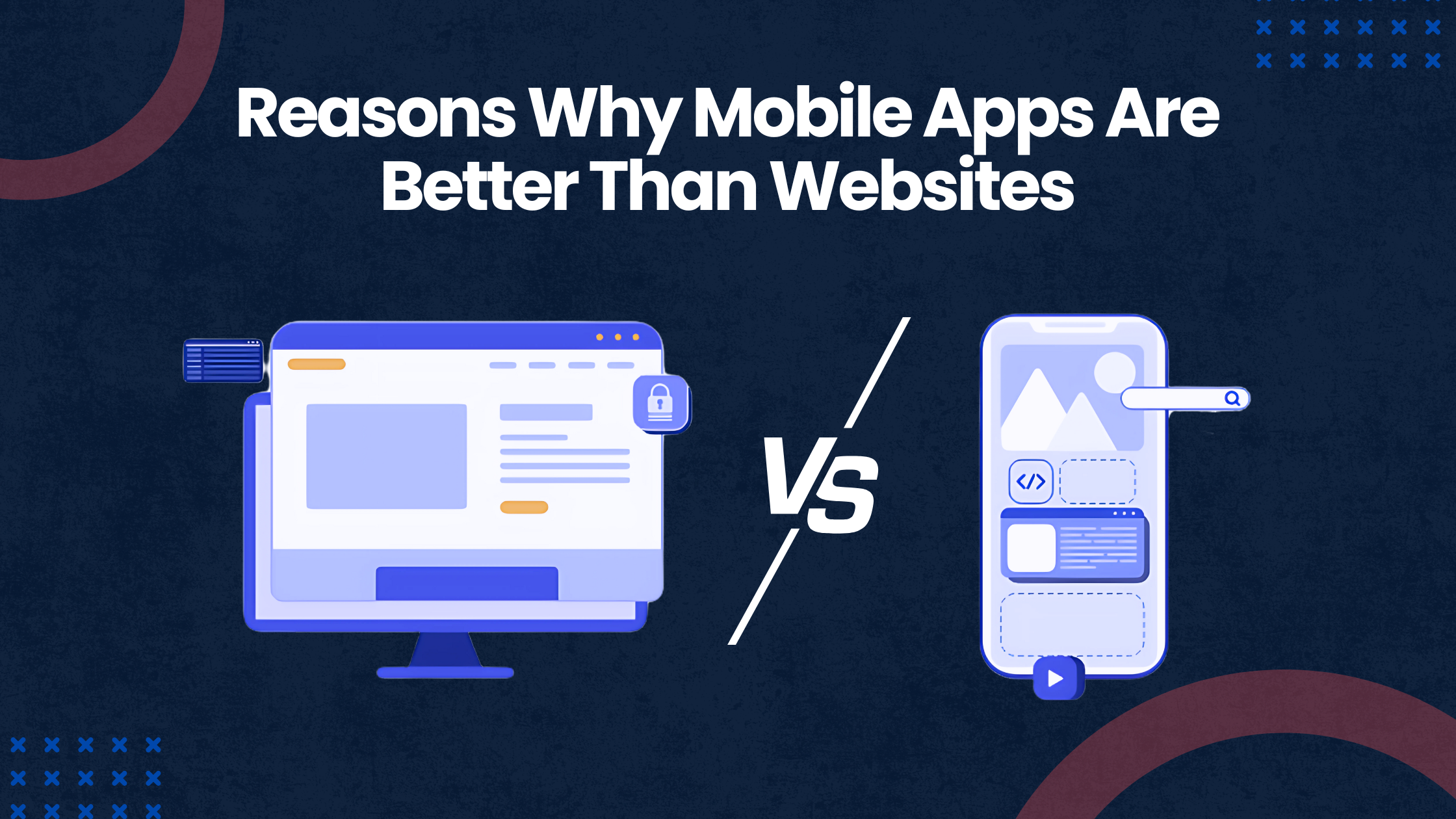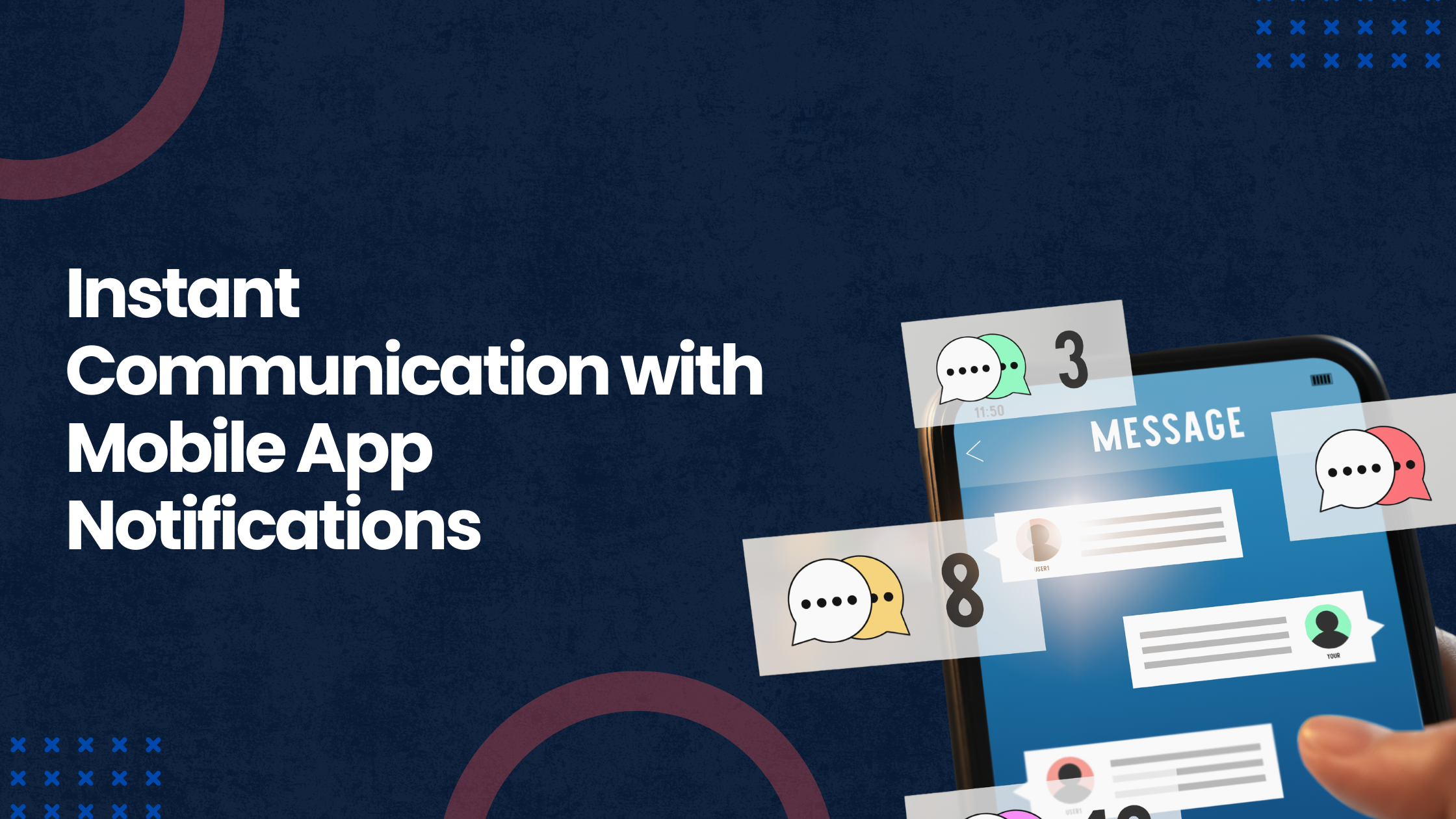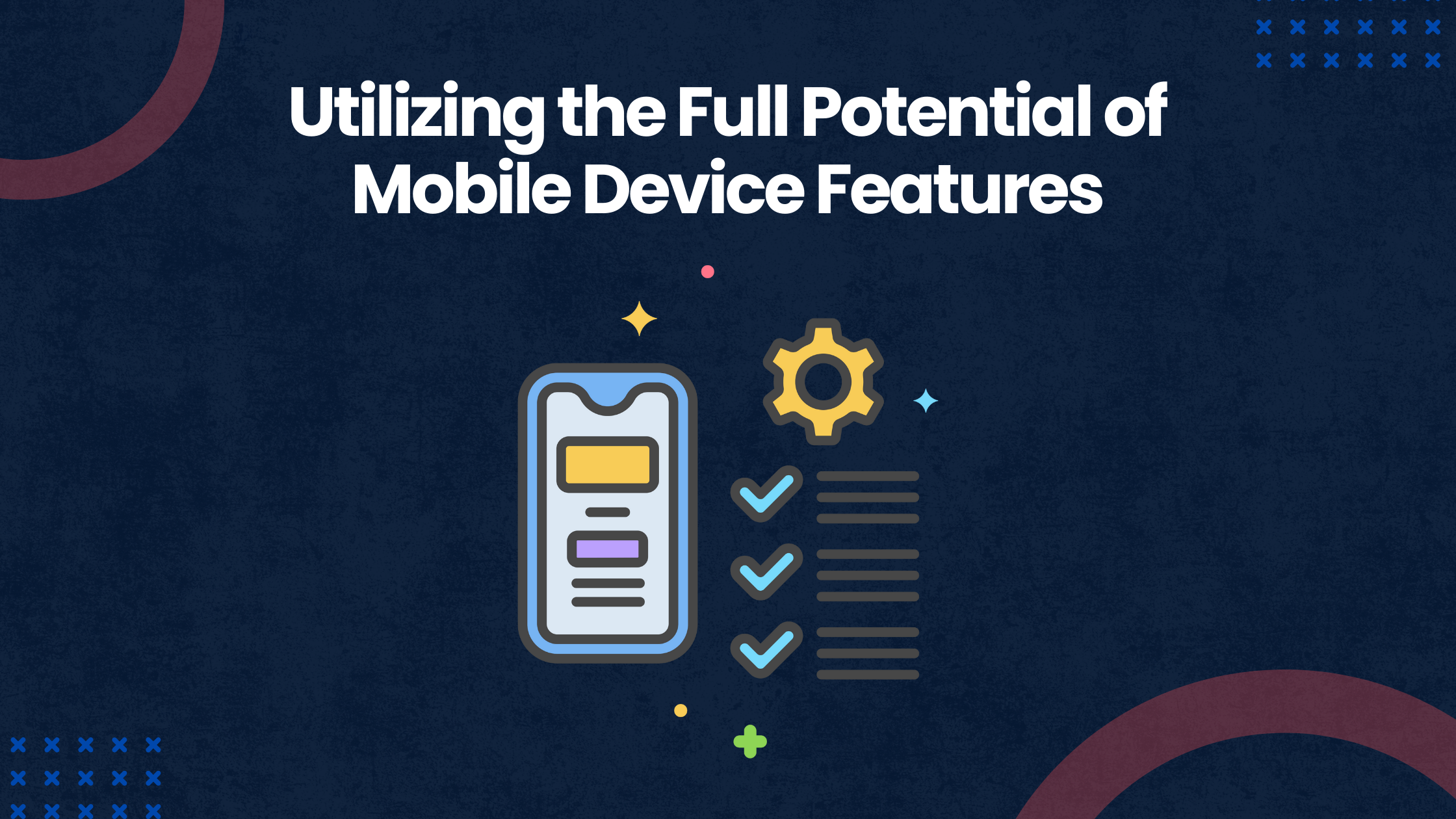
Mobile devices have taken the center stage in today’s digital landscape, accounting for more than 60% of global web traffic. The competition between mobile apps and websites is no longer a fair match, mobile apps are better than websites in many key aspects.. Ask yourself, when was the last time you opened a browser on your phone? Nearly 92% of users instinctively open mobile apps instead of websites because apps provide a smoother, faster, and more engaging experience. It's no surprise that most people now spend the majority of their mobile internet time using apps rather than browsing the web.
With the number of mobile users now surpassing desktop users, it’s no surprise that businesses are shifting their focus toward mobile-first strategies. Whether it’s ordering food, booking a cab, or checking the latest updates, consumers are spending more time on mobile apps than ever before.
This increasing app usage poses a critical question for businesses: Should you invest in a mobile app or a mobile-optimized website? While both options offer value, recent trends and user behavior make a compelling case for one over the other. In fact, studies show that users not only prefer mobile apps over websites, but also engage with them longer and more frequently.
So, why are mobile apps becoming the primary option for businesses and users alike? From personalized experiences and better performance to offline accessibility and higher conversion rates, the reasons are stacking up. In this blog, we’ll explore why mobile apps are better than websites and how they offer a competitive edge in customer engagement, retention, and growth.

Why Do Businesses Need Mobile Apps?
In today’s digital world, mobile apps have emerged as a powerful tool for businesses aiming to improve engagement, increase conversions, and meet evolving customer expectations. While websites still hold value for reach and discoverability, the advantages of mobile apps have made them the preferred choice for both businesses and users.
Mobile apps offer faster performance, personalized user experiences, and convenient access from anywhere. These factors contribute significantly to higher customer satisfaction and stronger brand loyalty. Unlike traditional websites, apps take advantage of smartphone features such as GPS, cameras, and notifications, allowing for more interactive and intelligent user experiences. Additionally, apps often function without an internet connection, providing uninterrupted access to services and content.
But the real proof lies in the numbers. According to recent statistics:
A staggering 91.9% of smartphone usage time is spent on mobile apps, while only 8.1% goes to web browsers.
Mobile devices generate 59% of global website traffic, but apps dominate in terms of time spent and user engagement.
In industries like retail, users view 4.2x more products per session in apps compared to mobile websites.
Mobile apps deliver 3x higher conversion rates than mobile sites, making them a clear winner for revenue generation.
Given the immersive experiences, greater engagement, and clear ROI, it's easy to understand why mobile apps are better than websites for businesses looking to grow in a market influenced by mobile applications. As consumer behavior continues to evolve, investing in a mobile app has become essential for businesses seeking a competitive edge.

Reasons Why Mobile Apps Are Better Than Websites
Mobile apps are better than websites when it comes to delivering an exceptional customer experience, even websites that are mobile optimized can't come close to mobile applications when it comes to giving a seamless user experience
For businesses, the real power of mobile apps lies in data. Unlike traditional websites, mobile applications allow companies to collect detailed and actionable insights about user behavior. This data makes it significantly easier to create targeted, effective marketing campaigns, something that’s often difficult to achieve through standard web analytics.
But that's just scratching the surface.
Several compelling reasons make investing in a mobile application a better option for your business. Below, we’ve outlined the top 10 reasons that strongly support the claim that mobile apps are better than websites, and why choosing one might be the smartest move your company can make.

Mobile Apps Give Better User Experience
The ability of mobile apps to effortlessly adapt to individual user preferences gives mobile apps a clear advantage over websites.. Rather than taking a universal approach, apps provide a personalized experience built on a person's interests, location, and usage habits.
As soon as users launch an app, they can establish their preferences, ensuring they encounter content that truly matters to them. Over time, the app learns from their actions, what they browse, click on, and interact with, to enhance recommendations and updates. Businesses can also utilize A/B testing to try out different experiences and determine what resonates best with their audience.
However, personalization goes beyond just creating a smoother experience; it significantly impacts conversions as well. When users feel that an app understands them, they are much more likely to engage, return, and even make a purchase. Instead of walking through generic content that feels impersonal and robotic, they enjoy a personalized experience that feels relevant and natural, however, it is not only a feature; it’s what transforms an application into something intuitive, engaging, and, most importantly, human.

Email has traditionally been a primary channel for businesses to engage with their audience. But with overflowing inboxes and declining open rates, most messages are now ignored.
This is where mobile app notifications come into play. Unlike emails that often get lost or ignored, app notifications enable businesses to engage users in a more direct, interactive, and unnoticeable way, yet another reason why mobile apps are better than websites for building loyalty.
There are two types of app notifications:
Push Notifications pop up on a user’s screen for reminders, special discounts, or important updates, even when they aren’t actively using the application.
In-App Notifications show up only when a user is engaged with the app to make them effective for guiding users, sharing updates, or refining the in-app experience.
By utilizing the ability to send real-time messages directly to the device of the user, businesses can improve engagement, initiate actions, and remain memorable, without getting lost in the clutter of an inbox.

Unlimited Creative Freedom in Design
Despite the progress in web design, mobile websites face significant limitations as they depend on browsers to operate. This reliance means they are constrained by basic browser features like the back button, refresh button, and address bar.
In contrast, mobile apps do not have these limitations, providing designers with complete creative freedom to enable the creation of intuitive experiences through advanced gestures such as tap, swipe, drag, pinch, and hold.
This opens up a realm of possibilities! For instance, rather than clicking buttons for navigation, an app can allow users to swipe effortlessly between steps, resulting in smoother and more natural interactions.
With mobile apps, design goes beyond aesthetics. It's about creating an experience that feels intuitive, fluid, and visually engaging for the user.

Stay Connected, Even When You Are Offline
Another benefit of using mobile apps is that they work without an internet connection. While both the app and website rely on the internet for most functions, the applications can still provide important features and some loaded content even when the user is disconnected or does not have an internet connection.
For instance, consider a banking app. Users can calculate taxes, estimate loan payments, or check their loan limits without needing an internet connection, all without the delay of loading a webpage.
While mobile websites can utilize caching to save some data, their offline functionality is quite limited in comparison to apps. With a mobile app, users can access vital tools and information anytime and anywhere. No wifi or data needed.

Mobile Apps Are Faster Than Websites
When it comes to performance, mobile apps outperform websites. A well developed mobile app operates faster and more smoothly than a mobile website, making every interaction quicker and more seamless. Why is that? Unlike websites that depend on web servers, apps store data directly on the device. This allows for almost instant retrieval of information, eliminating the delays associated with loading from the internet.
Mobile apps also remember user preferences and can act proactively, such as autofilling details or recommending relevant content, saving users valuable time. Interestingly, the technology behind mobile apps is nearly five times faster than JavaScript, which powers most mobile websites. While users may not notice the technology at work, they definitely experience the benefits through faster responses, smoother navigation, and an overall improved experience.

Potential of Mobile Devices Features
Another main benefit of mobile apps is their ability to use the built in features of the smartphone, just like a camera, GPS, contact list, and motion sensors. This improves functionality and also makes the apps more interactive and fun to use.
Think about it! Why go through the annoyance of typing in information when an app can automatically fill it in for you? Why upload a photo from your gallery when you can take one with the camera right away? For instance, a banking app allows users to take and submit a photo for verification instead of tolerating a long upload process.
By integrating flawlessly with device features, apps simplify everyday tasks to result in a better user experience and increased engagement, while websites can access some of these features (like GPS and the camera), they often face technological and privacy constraints. In short, mobile apps are better than websites for delivering feature-rich, interactive solutions.

A New Take on Branding
A mobile app is more than just an expansion of a company’s website, but it’s a chance to create a whole new brand experience. Unlike websites, which typically follow the company’s established design and style. Apps provide businesses with the flexibility to explore innovative branding strategies that resonate as modern, unique, and specifically designed for mobile users.
Some companies even leverage mobile apps as a way to shift into a completely new brand identity!
But it does not end there. Mobile apps can further boost user engagement by allowing users to personalize themes, colors, or layouts based on their preferences. This not only enhances the overall experience but also makes the brand feel more interactive and dynamic.

A New Path to Higher Conversions
If increasing conversions is your goal, mobile apps can actually make a difference by offering a smooth way to lead users through the conversion funnel, whether they just learn your brand or are ready to buy.
The apps can draw in both Top of the Funnel (ToFu) users, who just surf, and Bottom of the Funnel (BoFu) users, who are close to a decision. For instance, a utility app might attract casual users who can eventually be developed into loyal customers. On the other hand, apps like ecommerce platforms naturally pull in BoFu users who are already inclined to make a purchase.
What enhances the power of apps is their capability to target specific audiences with customized content and features. Unlike mobile websites, which aim for a broad audience, apps can provide a highly personalized experience, enabling businesses to connect with the right users at the right moment and effortlessly boost conversions.

Users Prefer Mobile Applications
It is well known that mobile apps are extremely popular among users. In fact, mobile users spend an impressive 88 percent of their time on apps and only 12 percent on mobile websites.
While a noteworthy portion of that time is spent on gaming and social media, the whole trend is evident as users find apps to be more engaging, convenient, and user-friendly. Whether it's for shopping, banking, or enhancing productivity, apps offer a smooth and quicker experience that keeps users returning.
For businesses, it’s the best opportunity to have a mobile application that helps them connect with users where they already spend most of their time on their smartphones.

Strengthening Brand Presence
People spend most of their time on phones, and whether they realize it or not, the apps visible on their home screens leave a lasting impression. Simply seeing an app icon regularly, even without opening it, subtly and strongly reinforces brand awareness.
Consider an app icon as a small billboard right on a user’s device. Each time they scroll through their phone, it serves as a reminder of the brand behind it. Over time, this consistent exposure helps shape their perception and keeps the brand at the forefront of their mind.
This concept is supported by Signal Detection Theory, which indicates that even when users consciously overlook something (like an ad), their brains still process it to some extent. Therefore, simply having a mobile app installed can foster a subconscious connection between the brand and the user, making them more inclined to engage when the opportunity arises.
Mobile Applications or Websites
Creating both a mobile website and a mobile app can be costly for your business, so it is important to select the right option based on your objectives and budget. While each has its own pros and cons, mobile apps usually lead to higher conversion rates and better customer loyalty. Also, mobile apps provide a more personalized experience, optimized performance, and exclusive features that a mobile website cannot offer.
But here’s the thing: developing a sleek app isn’t sufficient. To make sure it actually delivers results (and doesn’t just become another thing you have to manage), you need to test it thoroughly.
That is where mobile app A/B testing shows up. By testing with different features, app flows, and UI changes, you can refine the user experience, boost engagement, and improve conversion rates. Having a functional app is just a start, ongoing optimization is what turns it into a real growth driver.
Final Thoughts
Although mobile websites have advantages of their own, mobile apps are better than websites in delivering a more tailored, engaging, and user-friendly experience. Whether it's leveraging device specific features, enabling offline access, or sending timely notifications, apps consistently outperform websites across the board.
If your business aims to boost customer loyalty, elevate conversions, and offer a premium digital experience, investing in a mobile app is the way forward. And remember, just building an app isn't enough. Continuous optimization and updates are what turn a good app into a business growth engine.
Not sure where to start? Contact Expedey’s team for expert guidance. Our Custom Mobile Application Development Services are tailored to help you build high performing, scalable apps that align perfectly with your goals and user expectations.
Frequently Asked Questions
What is the advantage of using a mobile app?
Mobile apps offer faster performance, better personalization, and easier access on the go. They allow businesses to engage users directly through notifications, use features like the camera and location services, and work even without an internet connection. This creates a smoother experience and often leads to higher customer satisfaction and stronger brand loyalty.
Why are apps faster than websites?
Apps are faster than websites because they store data locally on the device, reducing the need to fetch information from a server every time. They are also built using native code optimized for mobile performance, allowing quicker load times, smoother interactions, and better responsiveness compared to browser-based websites.
Why should my business invest in a mobile app?
Investing in a mobile app helps your business boost customer engagement, improve brand loyalty, and provide personalized experiences. Apps offer faster performance, offline access, and direct communication through push notifications, making them a powerful tool for driving sales, increasing retention, and staying ahead in today’s mobile-driven market.
Can mobile apps be integrated with other business systems?
Yes, mobile apps can be integrated with various business systems such as CRMs, ERPs, inventory management, payment gateways, and analytics platforms. This allows for real time data synchronization, improved workflow efficiency, and a more connected and seamless business operation.
How can I measure the success of my mobile app?
You can measure your mobile app’s success by tracking key performance indicators (KPIs) such as user retention rate, active users, session duration, conversion rates, app store ratings, and customer feedback. Tools like Google Analytics for Firebase, Mixpanel, or App Annie can help you gather and analyze this data to assess performance and identify improvement areas.
Are mobile apps more expensive to develop than websites?
Yes, mobile apps are generally more expensive to develop than websites. This is because app development often requires building separate versions for iOS and Android, integrating device specific features, and ensuring rigorous testing across various screen sizes and operating systems. However, the investment can be worthwhile given the enhanced performance, user experience, and long-term engagement mobile apps provide.
Recent Blogs
What is Meant by Trustless Transactions in Blockchain?
Discover how trustless transactions in blockchain eliminate the need for intermediaries, ensuring transparency, security, and automation through smart contracts. Explore the future of decentralized, trust-free transactions
How To Build A Responsive Website
Discover the importance of responsive web design and how to create a mobile-friendly website that adapts to any screen size. Learn essential tips to enhance user experience and boost your site's performance.
Benefits Of Using WordPress For Your Ecommerce Website
Discover the benefits of using WordPress for your ecommerce website. Learn how WordPress and WooCommerce offer flexibility, customization, and scalability to grow your online store effortlessly.
Quick Links
Our Offices

USA
12828 Willow Centre Dr Ste D #978 Houston, TX 77066
PAKISTAN
Suite # 207, 2nd Floor, Park Avenue Building, Block 6, P.E.C.H.S, Shahrah-e-Faisal, Karachi.Contact Us
© 2024 Expedey. All Rights Reserved.

